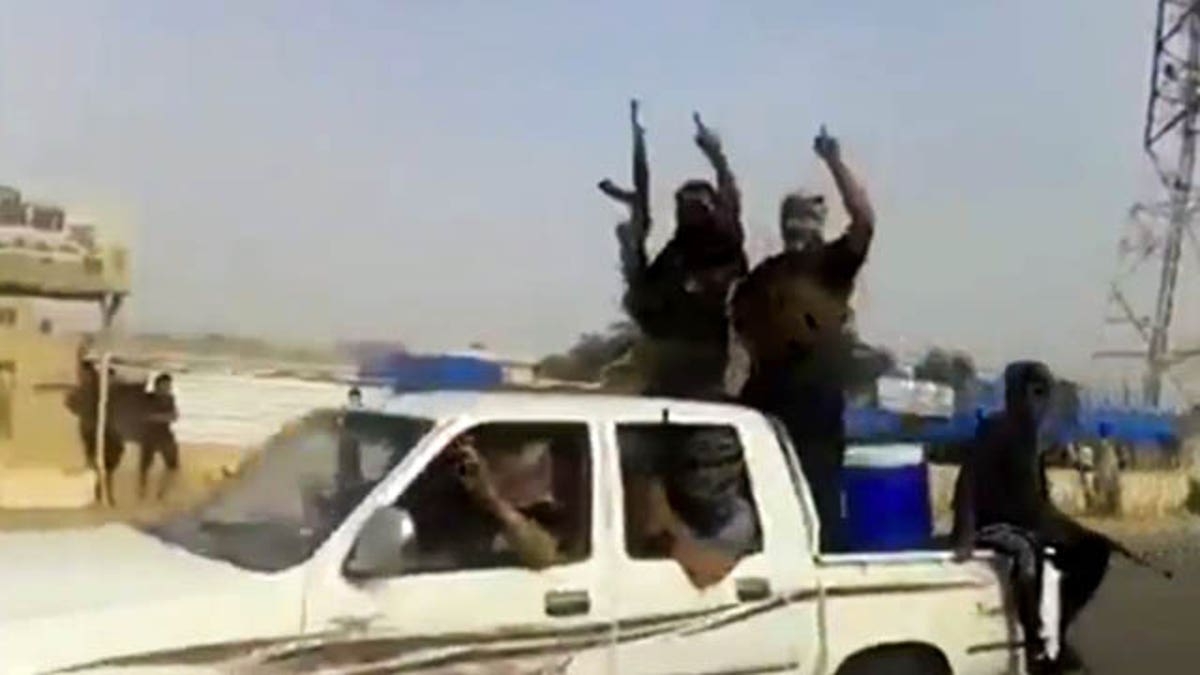
June 17, 2014: In this image taken from video uploaded to a militant social media account, which has been authenticated based on its contents and other AP reporting, Al Qaeda-inspired Islamic State of Iraq and the Levant militants arrive to Iraq's largest oil refinery in Beiji, some 155 miles north of Baghdad. (AP Photo via militant video)
Iraq's government insisted Thursday that security forces were still in control of the country's largest oil refinery, despite claims that Al Qaeda-aligned Sunni Muslim insurgents had raised their flag over the facility.
A witness who drove past the Beiji refinery told the Associated Press that militants from the Islamic State of Iraq and the Levant (ISIS) had hung black banners on the refinery's watch towers and were manning checkpoints around the building. He said a huge fire in one of its tankers was raging at the time.
The witness spoke on condition of anonymity because he feared reprisals.
An Iraqi security official said the government force protecting the refinery was still inside Thursday and that they were in regular contact with Baghdad. The refinery's workers had been evacuated to nearby villages, he said.
He also said the militants took over a building just outside the refinery and were using it to fire at the government force.
The official also spoke on condition of anonymity because he was not authorized to speak to journalists.
The army officer in charge of protecting the refinery, Col. Ali al-Qureishi, told state-run Iraqiya television by telephone that the facility remained under his control. He said nearly 100 militants had been killed as his forces repelled wave after wave of attacks since Tuesday. The country's chief military spokesman, Lt. Gen. Qassim al-Moussawi, echoed al-Qureishi's assertion in comments made at a news conference Thursday.
One of the militants laying siege to the refinery confirmed by telephone that the facility remained in government hands and blamed the deployment of helicopter gunships for what he said their failure to capture it. The militant identified himself only by his alias, Abu Anas, but there was no way to verify his identity or location. The security official, however, said as many as four helicopter gunships have been deployed over the facility since daybreak.
Iraq’s al-Sharqiya TV reported that a ceasefire had been organized between ISIS and government forces around the refinery so foreign workers could leave, according to The Telegraph. The ceasefire was reportedly organized by regional tribal chiefs.
The Beiji refinery accounts for a little more than a quarter of the country's entire refining capacity -- all of which goes toward domestic consumption for things like gasoline, cooking oil and fuel for power stations.
Gasoline produced at the refinery largely goes to northern Iraq and its closure has caused a shortage in the region.
The assault on the refinery also has affected global gasoline prices, as the U.S. national average price reached $3.67 per gallon, the highest price for this time of year since 2008, the year gasoline hit its all-time high in America. The price of benchmark crude for July delivery rose 57 cents Thursday to $106.54 per barrel in electronic trading on the New York Mercantile Exchange.
The campaign by the ISIS militants has raised the specter of the sectarian warfare that nearly tore the country apart in 2006 and 2007, with the popular mobilization to fight the insurgents taking an increasingly sectarian slant, particularly after Iraq's top Shiite cleric made a call to arms on Friday.
The Islamic State has vowed to march to Baghdad and the Shiite holy cities of Karbala and Najaf, home to some of the sect's most revered shrines, in the worst threat to Iraq's stability since U.S. troops left in late 2011. The militants also have tried to capture Samarra, a city north of Baghdad and home to another major Shiite shrine.
In an incident that harkens back to the dark days of Iraq's sectarian bloodletting of 2006 and 2007, the bullet-riddled bodies of four men, presumably Sunnis, were discovered in the Shiite Baghdad district of Abu Dashir on Thursday, police and morgue officials said. The bodies were handcuffed and had gunshot wounds to the head and chest.
Also in Baghdad, a roadside bomb hit a police patrol on a highway in the east of the city, killing two police officers and wounding two, police and hospital officials said. Earlier Thursday, a car bomb exploded inside a parking lot in Baghdad's southeastern Shiite neighborhood of New Baghdad, killing three people and wounding seven, the officials said.
All officials spoke on condition of anonymity because they were not authorized to speak to journalists.
The U.S. has pushed Iraq to present its people a clear coalition to fight the militants, with Vice President Joe Biden offering praise Wednesday for Iraq's Shiite, Sunni and Kurdish leaders as a means to tamper the sectarian anger roiling the country. It's unclear whether that will work, as Iraqi Prime Minister Nouri al-Maliki's Shiite-led government has faced widespread dissatisfaction from the nation's sizable Sunni and Kurdish minorities.
Al-Maliki, a Shiite, has rejected charges of bias and instead said the crisis has led Iraqis to rediscover "national unity."
"I tell all the brothers there have been negative practices by members of the military, civilians and militiamen, but that is not what we should be discussing," al-Maliki said Wednesday. "Our effort should not be focused here and leave the larger objective of defeating" the militants.
Still, al-Maliki's outreach remain largely rhetoric, with no concrete action to bridge differences with Sunnis and Kurds, who have been at loggerheads with the prime minister over their right to independently export oil from their self-rule region in the north and over territorial claims.
Iraqi Foreign Minister Hoshyar Zebari said Wednesday that his country had formally asked the U.S. to launch airstrikes against positions of the Islamic State.
The Associated Press contributed to this report.
